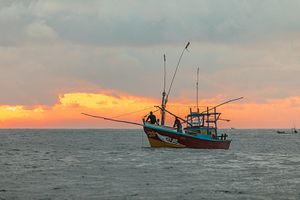Achieving maritime security is a top goal of any country with access to the sea and largely dependent on the seas for international trade and commerce. For such countries, securing vital sea lanes of communication is both a strategic and an economic interest of utmost importance. India’s Navy has grown in both size and capabilities since the late 1990s and is the only Navy with a blue water capability in South Asia. As India’s modernization efforts have persisted, there has been increased Indian involvement in Maritime domain awareness (MDA) with Indian technological assistance reaching different parts of the Indian Ocean region. Today, growing skepticism of multilateralism, regionalism, anti-globalization sentiments and nation’s self-first attitudes are hampering security cooperation.
Illegal, unreported and unregulated fishing (IUU) has been a bone of contention between India and Sri Lanka, souring otherwise cordial relations. Due to fears of Indian hegemonic designs, countries such as Sri Lanka are cautious when engaging India for assistance in Maritime security.
A Persistent Issue: IUU in Sri Lanka
Encroachment of Tamil Nadu trawlers into Sri Lankan waters by trespassing the International maritime boundary line (IMBL) is a serious threat to Sri Lanka and a continuous menace. Reportedly, IUU fishing in Sri Lankan waters by Tamil Nadu trawlers has caused direct losses for Sri Lanka between 2.3 and 8.2 billion rupees ($32.3 to $115.4 million) per year. Sri Lanka’s Fisheries (Regulation of Foreign Fishing Boats) Act No 59 of 1979, along with its amendments, provides the legal framework for imposing penalties on the offenders and perpetrators. Although activists, such as Thiyagaraj Waradas, have been vocal about regular arrests and prosecutions under the act, deterrence through implementing law and order is only one side of the coin. Tamil Nadu Trawlers engage in IUU because they have exhausted fishing stocks on their side of the IMBL. In order to divert and redirect mechanized bottom trawling to other forms of income, the Indian government should provide alternative incentives to Tamil Nadu fishermen. Therefore the Union Government subsidies to Tamil Nadu Fishing Sector are important reforms to be implemented. In order to deter IUU, the Sri Lankan Navy must step up with regular patrols and arrests for which maritime domain awareness and accurate real time reporting is a necessity.
What is Maritime Domain Awareness?
Steven Boraz, writing to Naval War College Review, states both ancient and modern navies have always engaged in MDA. It is not a novel concept. In order to understand the marine environment, it is important to gain situational awareness to prevent an attack, effectively counter an attack or to gain competitive advantage over the enemy. Today, MDA encompasses gathering information and conducting analysis of a myriad of issues such as maritime vessels of both friends and foe, submarine capabilities, and all aspects of maritime transportation. MDA is especially useful to deal with maritime security threats, which include maritime piracy, maritime terrorism, hijacking, and robberies at sea, trafficking of persons and illegal contraband and so on.
The concept does not apply to just “threats” in the maritime domain, but is also useful for economic purposes such as fisheries management. For example: EcoGIS (geographic mapping system) can be used for detecting fishing grounds. In a country like Sri Lanka EcoGIS mapping could be helpful in addition to the use of catch data regulations and vessel monitoring systems. The latter two usages by fishing authorities in Sri Lanka to track fishing is limited in application. A study by Karunathileke, Bandara and Manikarachchi has found that around 75 percent of the fishermen within the scope of the study were having problems with using log books due to illiteracy and sometimes also miscommunicate with fisheries inspectors. Investing in maritime domain awareness and coordinating with authorities of other countries remain contemporary issues for the security sector. Moreover arrests of suspicious trawlers can be made with solid evidence if there is accurate statistics, analytics, and real-time images.
Indian Assistance: To Cooperate or Not?
The Indian Navy has embarked on an ambitious project of establishing a network of coastal surveillance radar stations in the Indo-Pacific, which has already reached Seychelles, Maldives, Mauritius, and Sri Lanka. The network is expected to be coordinated through joint operation centers. The Observer Research Foundation has highlighted critical gaps in this project, including the absence of a coastal security bill for the establishment of a National Maritime Authority. Without such legal force, the project is only an ad hoc arrangement. Furthermore Indian security agencies have placed more emphasis on terrorism as opposed to non-traditional security threats such as IUU fishing and recommends stronger coastal regulation zones and clear identification of stakeholders for enhanced and coordinated littoral security architecture.
It is generally opined that India has geared up with such projects due to a perceived threat of a rising China challenging U.S. hegemony in the region. Therefore India’s re-vamped maritime security goals are supported by countries such as France and the United States. For example: An agreement to establish a ”joint maritime domain awareness mission” between the Indian Space Research Organisation (ISRO) and France’s National Centre for Space Studies (CNES) and obtaining sophisticated vessels such as unmanned combat aerial vehicles (UCAVs) and maritime drones from the United States.
Given the serious issue of IUU, as Sri Lanka’s immediate neighbor, Indian assistance on MDA is always in the cards for Sri Lanka. Colombo, however is vary of entering into deep cooperation fearing Indian hegemonic designs and aggravating China. Despite these considerations, IUU issues have been persistent and chronic compelling Sri Lanka to enter triadic security relationships with countries such as Australia and Japan as well. It remains important that Sri Lanka does not refute assistance in MDA, but enter such agreements and implement them for comprehensive solutions to maritime security issues with full awareness of both its strengths and weaknesses.
Natasha Fernando is a program officer at the Regional Centre for Strategic Studies in Colombo, Sri Lanka. Her views are independent.

































